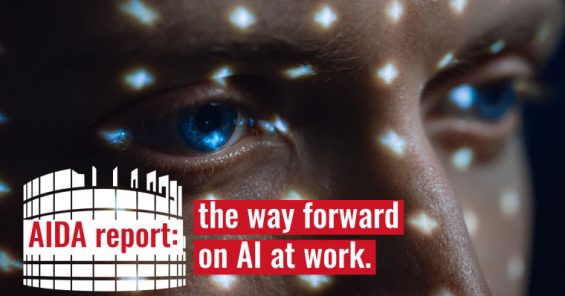AIDA Committee calls for legislative initiative on AI at work
23.03.22

UNI Europa welcomes the adoption by the European Parliament Special Committee on Artificial Intelligence in a Digital Age (AIDA Committee) of its Report Artificial Intelligence in a Digital Age. In particular, the call for a specific legislative initiative on the use of AI in the workplace shows the way forward.
The report includes language on the protection of workers’ rights and wellbeing, algorithms must always have human oversight, training of algorithm developers in ethical, transparency and anti-discriminatory issues, condemnation of AI-fueled surveillance in the workplace.
UNI Europa now calls on the rest of the Members of the European Parliament to adopt the AIDA report. With the AI Act in the works, it comes at a crucial time. UNI Europa highlights the need for legislative action to protect working people from abusive applications of AI in the workplace. The AI Act must integrate the AIDA report recommendations to do just that.
The own initiative report was led by Rapporteur Axel Voss (EPP, DE). A special mention goes to the MEPs who have raise the need to respect how workers are treated when it comes to AI.
Video: watch MEP Kim Van Sparrentak’s question and expert answers
The draft report was adopted with 25 in favour, 2 against and 6 abstentions. The next step is that it will be voted on in European Parliament Plenary in May 2022. With this final adoption, the AIDA Committee will conclude its mandate be brought to a close.
UNI Europa highlights three paragraphs in the report, which demonstrate that the members of the AIDA committee in the European Parliament:
73. Condemns the increased recourse to AI-fuelled surveillance in the workplace, often occurring without the workers’ knowledge, let alone their consent, particularly also in the context of teleworking, ; sustains that this practice should not be allowed, as it is extremely abusive of the fundamental right to privacy, data protection and the human dignity of the worker, social and labour rights and has also negative effects on their mental health, due to the degree of intrusion, its blanket or indiscriminate effect, or lack of safeguards for affected individuals.
135. i. Calls on the Commission and Member States to ensure appropriate protection of workers’ rights and wellbeing, such as non-discrimination, privacy, autonomy and human dignity in the use of AI and algorithmic management, including undue surveillance practices; stresses that where AI is used at work, employers must be transparent about the way AI is used and its influence on working conditions and that workers should always be informed and consulted prior to the use of AI based devices and practices; emphasises the fact that algorithms must always have human oversight and that their decisions must be accountable, contestable and, where relevant, reversible ; believes that the training of algorithm developers in ethical, transparency and anti-discriminatory issues should be encouraged;
135k. calls for … a legislative initiative on AI in the workplace;
For more information about the AI Act, please see the VoteWatch exclusive interview with Birte Dedden, Director of ICTS at Uni Europa: Artificial Intelligence Act. It touches upon some of the important issues raised by the AIDA report, including human oversight over AI applications and how biometric identification and monitoring affects employees.
Parliamentary report shows way forward for AI at work
Cathrine Hernández Festersen and Birte Dedden outline UNI Europa’s take on the ‘AIDA committee’ report, published yesterday. The European Parliament Special Committee on Artificial Intelligence in a Digital Age (AIDA Committee) adopted its Report Artificial Intelligence in a Digital Age. UNI Europa welcomes the call for a legislative initiative on the use of AI in the workplace. The report also includes important language on the protection of workers’ rights and wellbeing, algorithms must always have human oversight, training of algorithm developers in ethical, transparency and anti-discriminatory issues, condemnation of AI-fueled surveillance in the workplace. UNI Europa now calls on the rest of the Members of the European Parliament to adopt the AIDA report.
Posted by UNI Europa on Wednesday, March 23, 2022
You may also be interested in
Meetings & Events
2025
11
Mar
18
Mar
29
Apr
Protected: UNI Europa FATIMA Project – ICTS Workshop – Leuven – 29 April 2025
ICT & Related Services
Dear Colleagues,
We would like to invite you to the sector workshop for ICTS in the framework of the UNI Europa project on “Fair Working Time Matters” (FATIMA). The event will take place on 29 April 2025 in Leuven, Belgium. The meeting will start at 09:00 CEST and end at 16:30 CEST.

